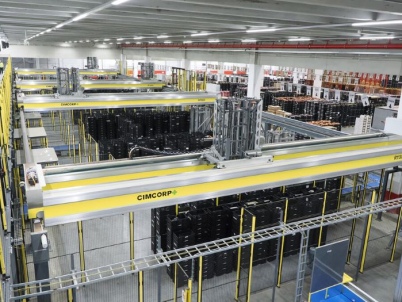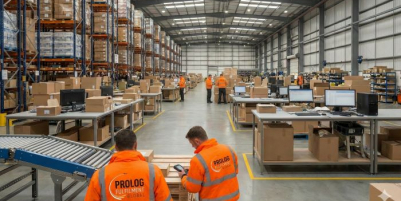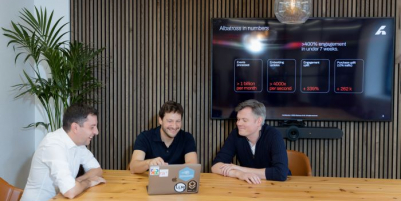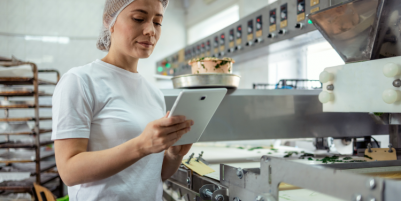-
Rite-Hite unveils new range of hydraulic kits to upgrade and extend dock leveller performance - 2 days ago
-
REWE and Cimcorp automate fresh supply chain for Berlin supermarkets and stores - 2 days ago
-
Q1 – A recovery period or time to fix, switch and scale? - 2 days ago
-
NULOGY’S SHOP FLOOR SOFTWARE TO POWER COMPLETE CO-PACKING’SOPERATIONS - February 13, 2026
-
Why lead generation depends upon good content - February 13, 2026
-
Wallapop and Albatross Sign Strategic Partnership to Bring Real-Time AI Discovery to the Future of Consumer-to-Consumer Commerce - February 12, 2026
-
Thorworld ramp helps Hubergroup to streamline its unloading operation - February 6, 2026
-
TRACKER INNOVATION FROM QUECLINK TO BOOST STOLEN VEHICLE RECOVERY PERFORMANCE - February 4, 2026
-
Flexi Narrow Aisle hits 50! - January 29, 2026
-
DERRY BROS ATTRACTS RECORD NUMBERS OF FREIGHT CUSTOMERS SEEKING CUSTOMS SUPPORT - January 29, 2026
A new parcel sorting system featuring some 160 LiBiao ‘Mini Yellow’ autonomous guided robots has gone live at South-East Asian supply chain solutions specialist Viettel Post’s storage and distribution hub, which is located on the outskirts of Hanoi.
Fast growing Viettel Post (VTPost) is the first Vietnamese logistics company to adopt fully automated robot-based parcel sortation technology.
The new sorting system, which was installed by LiBiao Robotics in just six days and, from start-to-finish, was fully operational in less than two weeks, provides VTPost with the capacity to process around 6,000 parcels of various sizes, weights and shapes every hour at the multi-client Hanoi site.
VTPost undertake a range of international and domestic express delivery, logistics and e-fulfilment services from the Hanoi facility and the introduction of the iconic LiBiao ‘Mini Yellow’ technology has more than doubled the site’s order throughput speed. In addition, the error rate is now virtually zero.
By making its parcel sortation process faster and more accurate VTPost has been able to further enhance the already high standard of its shipping services.
Furthermore, the decision to introduce greater levels of automation has delivered notable savings in operational costs and allowed several personnel to be redeployed to other areas within the business where they are now undertaking more profitable tasks.
Just a single worker is required to feed parcels on to the waiting sorting robots at each of the system’s induction stations. Once a parcel has been placed on to a robot a communications port captures order information data contained on the parcel’s label before LiBiao’s control and scheduling software issues instructions to guide each robot to the appropriate sorting bin, or destination chute, via the safest and most time-efficient route.
The system has more than 1,000 destination chutes and, on reaching the assigned chute, robots stop running and deposit their parcel before returning to an induction station, collecting another order and beginning the process over again.
Investment in advanced intralogistics technology is at the heart of VTPost’s long term development strategy. Nguyen Kim Thuan, VTPost’s CTO, said: “There is a global trend to automate logistics processes wherever possible. Giants such as China Post and Amazon have led the way and shown that by introducing robots to undertake the sortation of small parcels for e-commerce order fulfilment it is possible to improve overall time efficiency greatly and reduce picking errors significantly.” Le Tuan Anh, Deputy General Director of VTPost, added: “We are excited to be the first Vietnamese company to install this sophisticated sortation technology. But this is just the beginning. It is VTPost’s aim to continue to build the business by automating key operational processes at our storage and distribution hubs throughout Vietnam.”
With no fixed infrastructure requirements, a LiBiao mobile robot-based parcel sorting system can be installed in a fraction of the time needed to build a traditional conveyor-based sorting solution. And should VTPost require extra capacity at the Hanoi hub in the future, additional chutes and induction stations can be added easily, while additional robots can be introduced as and when they are needed to provide future-proof flexibility that will keep pace the growing demands of the business.
Supported by a network of authorised dealers, LiBiao’s international client base continues to grow and in 2024 it is estimated that 30 billion parcels will be processed by the company’s autonomous mobile robot sortation technology at sites across the world.

































